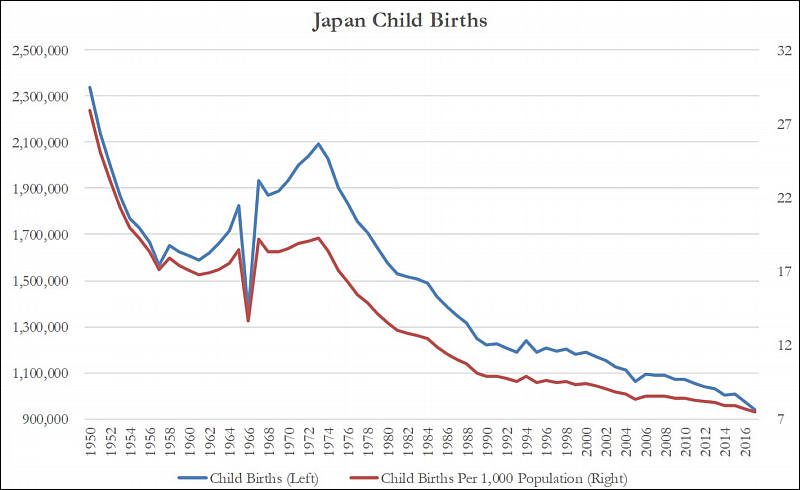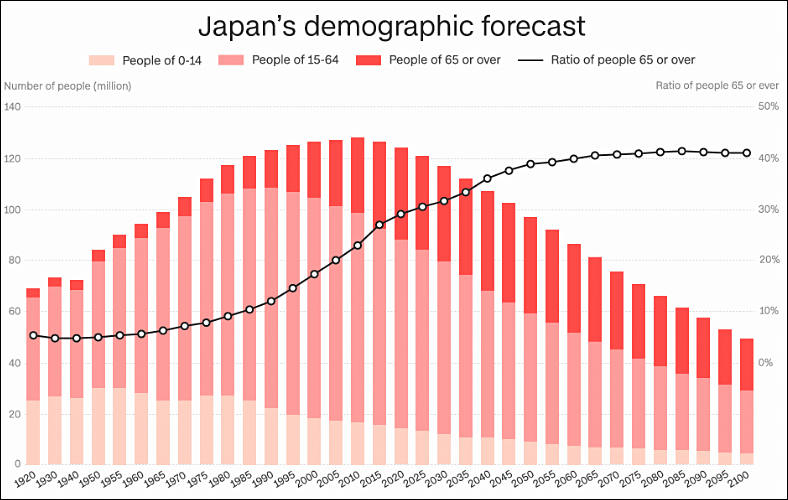
It allows to keep PV going, with more focus towards AI, but keeping be one of the few truly independent places.
-

The government of Shinzo Abe, prime minister, has made raising Japan’s birth rate a priority. On Friday it approved a budget that takes the first steps towards providing free pre-school, private high school and university education in an effort to reverse the trend.
Unless the low birth rate is reversed, the only option to increase Japan’s population would be for it to take in more immigrants. Yet despite high inflows of guest workers drawn by the strong economy, Japanese politicians have been reluctant to debate the subject.
Mr Abe’s government has instead set a target to raise the total fertility rate to 1.8. Officials hope the strong economy, combined with measures making it easier for women to combine work and childcare, will encourage families to have more children.

 sa1121.jpg800 x 490 - 50K
sa1121.jpg800 x 490 - 50K -
Capitalism needs new workers to sustain the endless growth...
-
I think here it is just simple projection for number for workers. Even with significant fall of production it'll be problem.
Japan issue is that people become smart and as they calculate expenses on apartments+transport+education they decide to use always condoms :-)
-
Japan already has the highest percentage of seniors in the world and it is rising. The population has been shrinking for decades. Reversing this trend in the long run is a do or die for the country as a whole.
-
The population has been shrinking for decades. Reversing this trend in the long run is a do or die for the country as a whole.
At first you need to take side. Either robots will rule and it'll be little number of workplaces, or all robots will rust it'll be too many workplaces and no one to work on them.
For now it looks like robots is the way things are going. So Japan can be actually better with their way.
-
Did not help at all.
The estimated number of babies born in 2018 dipped to 921,000 -- the lowest since records began in 1899 -- according to a report published Friday by the Ministry of Health, Labor and Welfare.
The number of newborns is estimated to have shrunk by 25,000 from 2017, and the figure remains under the 1 million mark for the third year running.
Deaths in 2018 also hit a postwar record high of 1.369 million, with a natural population decline of 448,000 -- the highest ever.


 sa6179.jpg788 x 500 - 80K
sa6179.jpg788 x 500 - 80K
Howdy, Stranger!
It looks like you're new here. If you want to get involved, click one of these buttons!
Categories
- Topics List23,993
- Blog5,725
- General and News1,354
- Hacks and Patches1,153
- ↳ Top Settings33
- ↳ Beginners256
- ↳ Archives402
- ↳ Hacks News and Development56
- Cameras2,368
- ↳ Panasonic995
- ↳ Canon118
- ↳ Sony156
- ↳ Nikon96
- ↳ Pentax and Samsung70
- ↳ Olympus and Fujifilm102
- ↳ Compacts and Camcorders300
- ↳ Smartphones for video97
- ↳ Pro Video Cameras191
- ↳ BlackMagic and other raw cameras116
- Skill1,960
- ↳ Business and distribution66
- ↳ Preparation, scripts and legal38
- ↳ Art149
- ↳ Import, Convert, Exporting291
- ↳ Editors191
- ↳ Effects and stunts115
- ↳ Color grading197
- ↳ Sound and Music280
- ↳ Lighting96
- ↳ Software and storage tips266
- Gear5,420
- ↳ Filters, Adapters, Matte boxes344
- ↳ Lenses1,582
- ↳ Follow focus and gears93
- ↳ Sound499
- ↳ Lighting gear314
- ↳ Camera movement230
- ↳ Gimbals and copters302
- ↳ Rigs and related stuff273
- ↳ Power solutions83
- ↳ Monitors and viewfinders340
- ↳ Tripods and fluid heads139
- ↳ Storage286
- ↳ Computers and studio gear560
- ↳ VR and 3D248
- Showcase1,859
- Marketplace2,834
- Offtopic1,320




